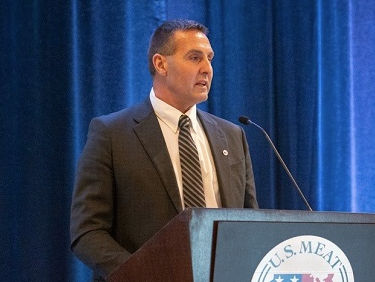
The U.S. Meat Export Federations strategic planning conference took place last month in Oklahoma City, where they named Dean Meyer the new Chairman. Meyer is a corn, soybean, and livestock producer from Rock Rapids, Iowa.
Farm Director KC Sheperd caught up with Meyer, who said the conference provided great information that brings something to everyone wanting to learn.
“Whether it’s the international staff that’s presenting or just intelligence from the market here, I appreciate those conferences, and I hope we can continue,” Meyer said.
Meyer said a meeting in person after not having the luxury to do so because of COVID-19 has made things much easier.
“We can have evening conversations, the hallway talk, and there’s so much to be gained from that alone,” Meyer said. “I learned so much from those on the other side of the sector, being a producer and visiting with the traders and the packers and then the international staff.”
Meyer said it resonates more when the international staff can come to the U.S. and tell their story.
“Just like it does when we go into their countries and tell our story, and that’s the beauty of the U.S. Meat Export Federation,” Meyer said. “We’ve got the best staff in the world working in those countries. And then, we can go as a nine-sector group and present what we produce. And in Southeast Asia, that’s what they want. They don’t just want our high-quality product. They want the story behind it.”
As USMEF enters the new year, Meyer said the U.S. is coming off some great export years, but the challenge will be production numbers.
“Our biggest challenge is going to be production numbers on the beef side,” Meyer said. “Of course, domestic consumption is still most important, but how can USMEF take these underutilized cuts and variety of meats, promote them in these international markets, and even switch cuts sometimes in markets.”
The international markets, Meyer said, have been very receptive and want what the U.S. has to offer.
“When you have countries like Japan that are 38 percent self-sustainable, they want our product, and they’re going to take the products we send,” Meyer said. “They trust our product, they know the story behind it, and I think pushing on in that direction where we’ve got to shift gears a little bit and promote some of the other cuts and some of the countries that mean most to us.”















